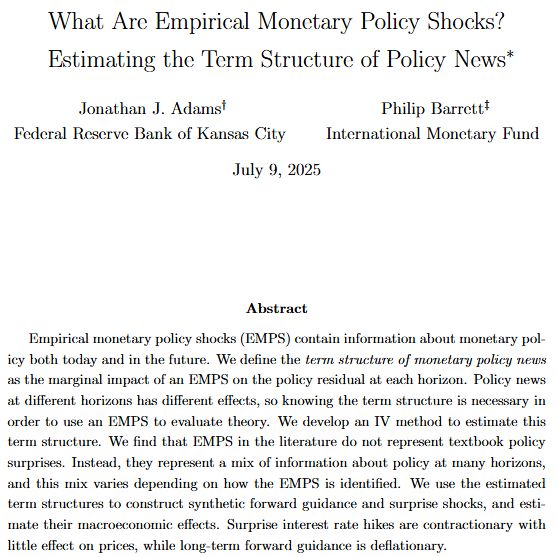
Jonathan Adams
@jonathanjadams.com
Macroeconomist studying expectations and information.
KC Fed (views are my own)
Research: www.jonathanjadams.com
KC Fed (views are my own)
Research: www.jonathanjadams.com
There’s plenty more in the paper (incl. litany of robustness checks)
Please take a look! www.imf.org/en/Publicati...
Please take a look! www.imf.org/en/Publicati...

What Are Empirical Monetary Policy Shocks? Estimating the Term Structure of Policy News
Empirical monetary policy shocks (EMPS) contain information about monetary policy both today and in the future. We define the term structure of monetary policy news as the marginal impact of an EMPS o...
www.imf.org
July 9, 2025 at 12:37 PM
There’s plenty more in the paper (incl. litany of robustness checks)
Please take a look! www.imf.org/en/Publicati...
Please take a look! www.imf.org/en/Publicati...
Bonus: IV estimation of the Taylor rule works very well. Reliable, robust.
If you are interested in this method, you can find the macro shocks we use here: github.com/jonathanjada...
If you are interested in this method, you can find the macro shocks we use here: github.com/jonathanjada...

GitHub - jonathanjadams/structuralshocks: Harmonized dataset of structural shocks for use as instrumental variables
Harmonized dataset of structural shocks for use as instrumental variables - jonathanjadams/structuralshocks
github.com
July 9, 2025 at 12:34 PM
Bonus: IV estimation of the Taylor rule works very well. Reliable, robust.
If you are interested in this method, you can find the macro shocks we use here: github.com/jonathanjada...
If you are interested in this method, you can find the macro shocks we use here: github.com/jonathanjada...
Application #2: We estimate the macro effects of synthetic MPS.
- The synthetic surprise is contractionary, but has no effect on prices.
- Instead, deflationary effects of (some) EMPS are due to their long-run news components.
- The synthetic surprise is contractionary, but has no effect on prices.
- Instead, deflationary effects of (some) EMPS are due to their long-run news components.
July 9, 2025 at 12:34 PM
Application #2: We estimate the macro effects of synthetic MPS.
- The synthetic surprise is contractionary, but has no effect on prices.
- Instead, deflationary effects of (some) EMPS are due to their long-run news components.
- The synthetic surprise is contractionary, but has no effect on prices.
- Instead, deflationary effects of (some) EMPS are due to their long-run news components.
Unwelcome news if you wanted to use EMPS to study textbook policy surprises?
Fortunately, we offer a way to do that (and more!) Using our method, it is possible to construct a *synthetic* monetary policy shock approximating any desired term structure of policy news!
Fortunately, we offer a way to do that (and more!) Using our method, it is possible to construct a *synthetic* monetary policy shock approximating any desired term structure of policy news!
July 9, 2025 at 12:34 PM
Unwelcome news if you wanted to use EMPS to study textbook policy surprises?
Fortunately, we offer a way to do that (and more!) Using our method, it is possible to construct a *synthetic* monetary policy shock approximating any desired term structure of policy news!
Fortunately, we offer a way to do that (and more!) Using our method, it is possible to construct a *synthetic* monetary policy shock approximating any desired term structure of policy news!
Finding: *all shocks* are mostly news.
Even the most surprise-like shocks are <50% due to immediate policy changes. Here’s the Aruoba-Drechsel narrative shock:
Even the most surprise-like shocks are <50% due to immediate policy changes. Here’s the Aruoba-Drechsel narrative shock:

July 9, 2025 at 12:34 PM
Finding: *all shocks* are mostly news.
Even the most surprise-like shocks are <50% due to immediate policy changes. Here’s the Aruoba-Drechsel narrative shock:
Even the most surprise-like shocks are <50% due to immediate policy changes. Here’s the Aruoba-Drechsel narrative shock:
Application #1: We estimate the term structures of popular EMPS in the literature.
E.g. here is the term structure for Swanson’s forward guidance shock. Nearly all the information is news about future policy.
E.g. here is the term structure for Swanson’s forward guidance shock. Nearly all the information is news about future policy.

July 9, 2025 at 12:34 PM
Application #1: We estimate the term structures of popular EMPS in the literature.
E.g. here is the term structure for Swanson’s forward guidance shock. Nearly all the information is news about future policy.
E.g. here is the term structure for Swanson’s forward guidance shock. Nearly all the information is news about future policy.
This is an unbiased estimator of the term structure! We also derive a smooth-local-projection variant.
Convenient: both can be written as a single-stage estimator with analytical standard errors (no bootstrap!)
Convenient: both can be written as a single-stage estimator with analytical standard errors (no bootstrap!)
July 9, 2025 at 12:34 PM
This is an unbiased estimator of the term structure! We also derive a smooth-local-projection variant.
Convenient: both can be written as a single-stage estimator with analytical standard errors (no bootstrap!)
Convenient: both can be written as a single-stage estimator with analytical standard errors (no bootstrap!)
Estimation has 4 stages:
1. Instrument for endogenous variables using macro IVs (Barnichon-Mesters)
2. Estimate policy rule by IV
3. Whiten the policy residual to find the innovation
4. Regress on past EMPS (local projection)
The coefficients from the final stage = term structure
1. Instrument for endogenous variables using macro IVs (Barnichon-Mesters)
2. Estimate policy rule by IV
3. Whiten the policy residual to find the innovation
4. Regress on past EMPS (local projection)
The coefficients from the final stage = term structure
July 9, 2025 at 12:34 PM
Estimation has 4 stages:
1. Instrument for endogenous variables using macro IVs (Barnichon-Mesters)
2. Estimate policy rule by IV
3. Whiten the policy residual to find the innovation
4. Regress on past EMPS (local projection)
The coefficients from the final stage = term structure
1. Instrument for endogenous variables using macro IVs (Barnichon-Mesters)
2. Estimate policy rule by IV
3. Whiten the policy residual to find the innovation
4. Regress on past EMPS (local projection)
The coefficients from the final stage = term structure
So, if we want to use EMPS to evaluate our theories, we absolutely need to know how they depend on surprise vs news over many horizons. We call this the *Term Structure of Monetary Policy News*.
Fortunately: there is a way to estimate this term structure!
Fortunately: there is a way to estimate this term structure!
July 9, 2025 at 12:34 PM
So, if we want to use EMPS to evaluate our theories, we absolutely need to know how they depend on surprise vs news over many horizons. We call this the *Term Structure of Monetary Policy News*.
Fortunately: there is a way to estimate this term structure!
Fortunately: there is a way to estimate this term structure!
Important: surprise shocks have different effects from news shocks at every news horizon.
Here’s how they affect prices in the New Keynesian model:
Here’s how they affect prices in the New Keynesian model:

July 9, 2025 at 12:34 PM
Important: surprise shocks have different effects from news shocks at every news horizon.
Here’s how they affect prices in the New Keynesian model:
Here’s how they affect prices in the New Keynesian model:
Background:
EMPS are used to evaluate our theories of monetary policy. But this cannot really be done without knowing what the EMPS *are*.
EMPS are not just textbook target rate surprises. They also contain “news shocks” about future policy.
EMPS are used to evaluate our theories of monetary policy. But this cannot really be done without knowing what the EMPS *are*.
EMPS are not just textbook target rate surprises. They also contain “news shocks” about future policy.
July 9, 2025 at 12:34 PM
Background:
EMPS are used to evaluate our theories of monetary policy. But this cannot really be done without knowing what the EMPS *are*.
EMPS are not just textbook target rate surprises. They also contain “news shocks” about future policy.
EMPS are used to evaluate our theories of monetary policy. But this cannot really be done without knowing what the EMPS *are*.
EMPS are not just textbook target rate surprises. They also contain “news shocks” about future policy.
Philip Barrett @phibar.bsky.social and I address this question in a new working paper.
In it, we propose a method to extract the news that EMPS contain about future policy, and apply the method to many shocks from the literature. There is a lot to learn!
In it, we propose a method to extract the news that EMPS contain about future policy, and apply the method to many shocks from the literature. There is a lot to learn!

July 9, 2025 at 12:34 PM
Philip Barrett @phibar.bsky.social and I address this question in a new working paper.
In it, we propose a method to extract the news that EMPS contain about future policy, and apply the method to many shocks from the literature. There is a lot to learn!
In it, we propose a method to extract the news that EMPS contain about future policy, and apply the method to many shocks from the literature. There is a lot to learn!
Frankly, I think it *is* preferable to have all the proof details spelled out in an appendix.
This will lead to some long appendices, of course. It is a problem that some journals punish this by requiring that page limits include proofs. That's a mistake. We don't require page limits for code!
This will lead to some long appendices, of course. It is a problem that some journals punish this by requiring that page limits include proofs. That's a mistake. We don't require page limits for code!
December 10, 2024 at 2:34 AM
Frankly, I think it *is* preferable to have all the proof details spelled out in an appendix.
This will lead to some long appendices, of course. It is a problem that some journals punish this by requiring that page limits include proofs. That's a mistake. We don't require page limits for code!
This will lead to some long appendices, of course. It is a problem that some journals punish this by requiring that page limits include proofs. That's a mistake. We don't require page limits for code!
I would guess one of the core reasons for this is the heterogeneity in math knowledge among economists, even in theory literatures. As a result:
1. Readers cannot be trusted to fill in the gaps
2. Readers may not trust the writer to do so
Econ editors and referees push both of these points.
1. Readers cannot be trusted to fill in the gaps
2. Readers may not trust the writer to do so
Econ editors and referees push both of these points.
December 9, 2024 at 11:45 PM
I would guess one of the core reasons for this is the heterogeneity in math knowledge among economists, even in theory literatures. As a result:
1. Readers cannot be trusted to fill in the gaps
2. Readers may not trust the writer to do so
Econ editors and referees push both of these points.
1. Readers cannot be trusted to fill in the gaps
2. Readers may not trust the writer to do so
Econ editors and referees push both of these points.
Is that because the department has to pay the tuition expense to the university? Or other costs?
November 19, 2024 at 4:27 PM
Is that because the department has to pay the tuition expense to the university? Or other costs?

